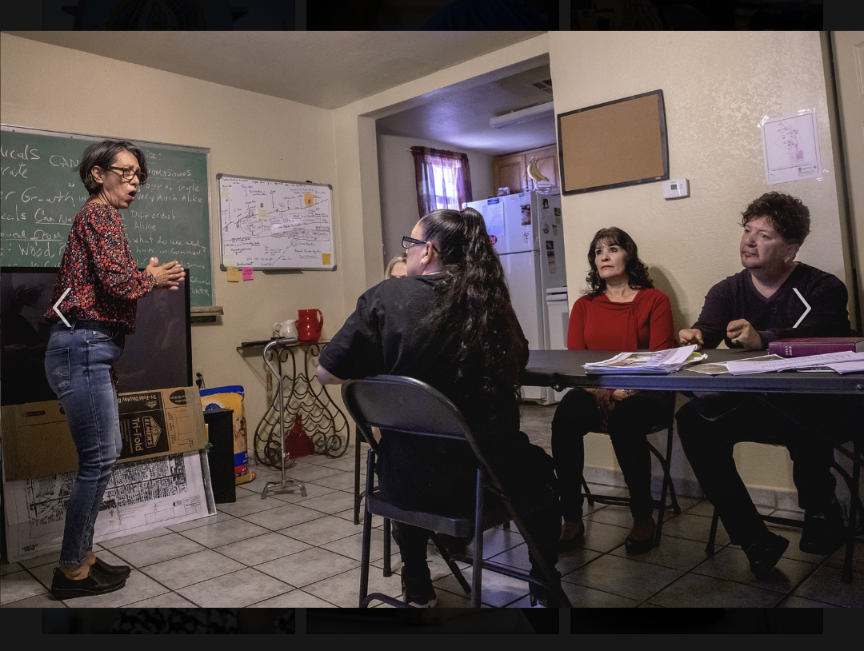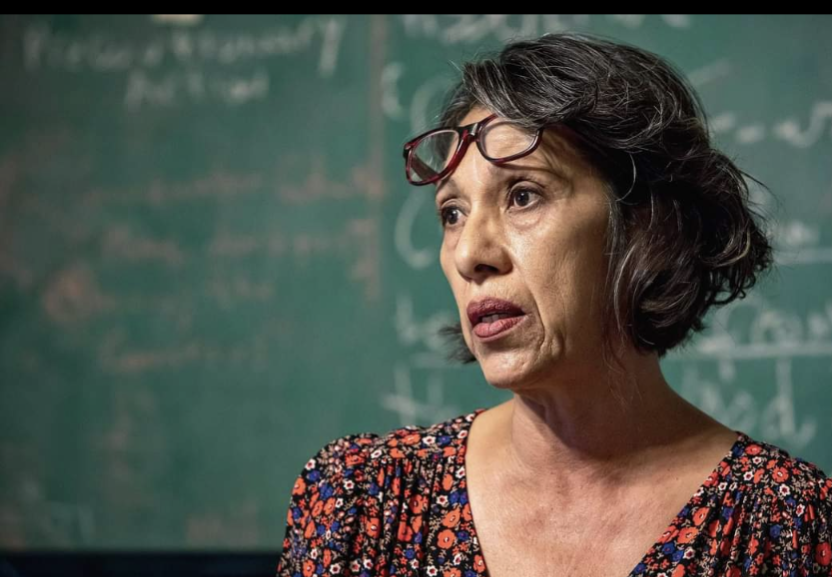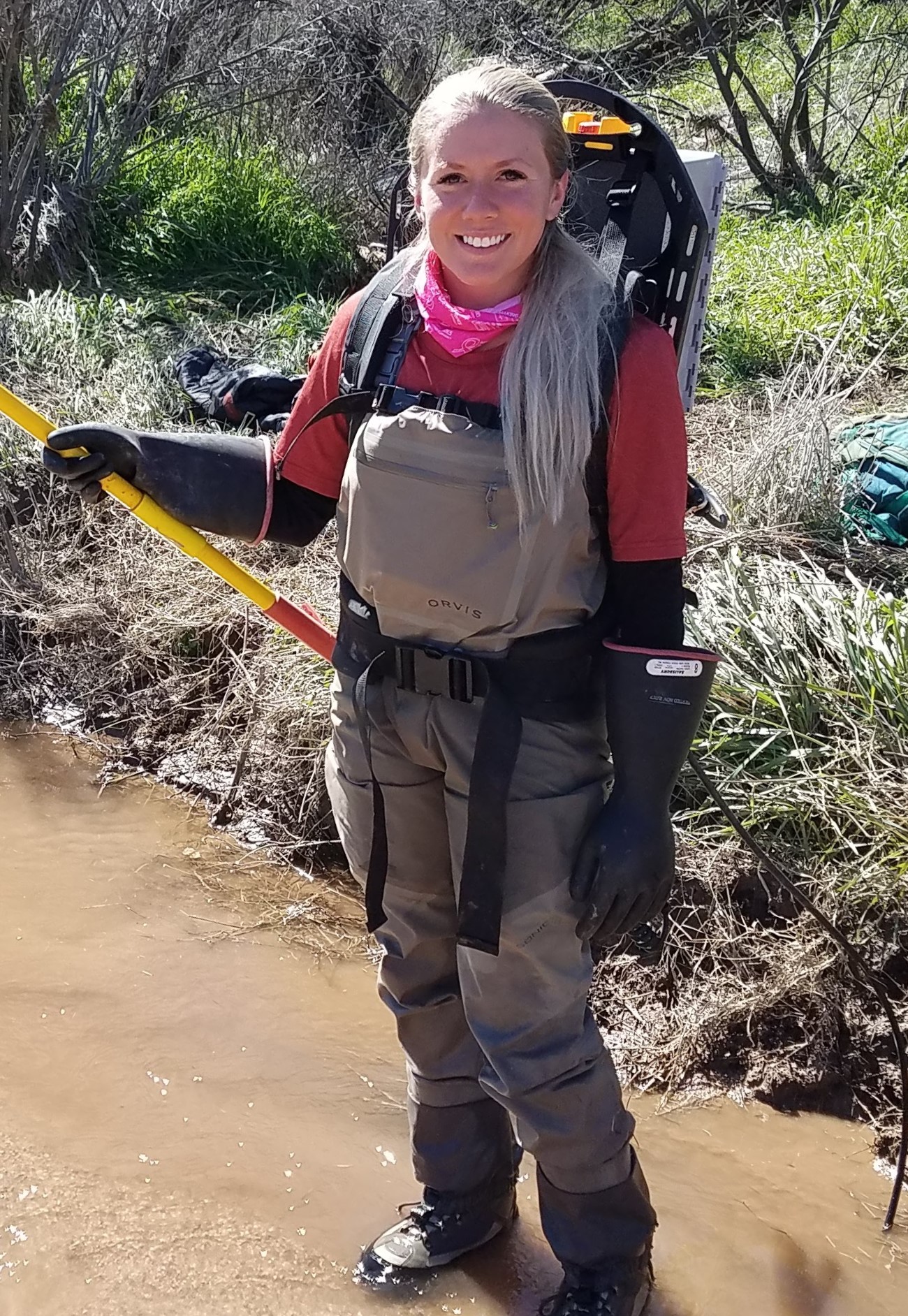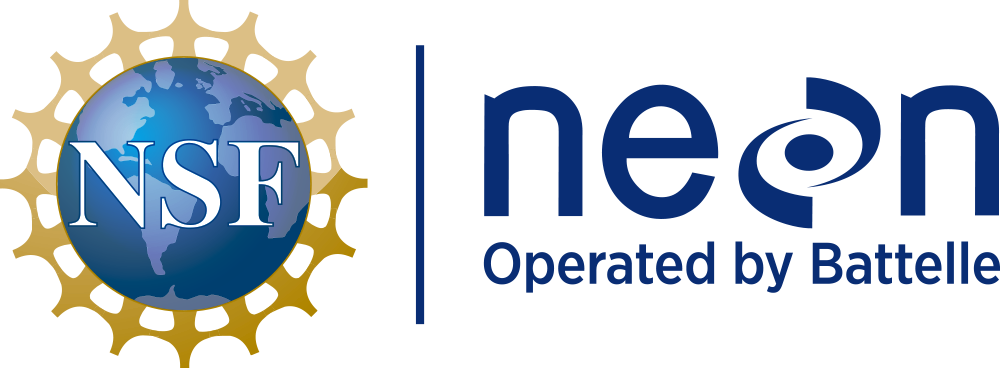Apply now to join our next cohort of Community Science Fellows and Community Leads!

This project aims to educate the South Tucson community about known toxic chemicals that exist in their area, particularly in their drinking water, and what health risks they may be subject to as a result. Explaining what Polyfluoroalkyl substances (PFAS) are to residents with little scientific background and who may not understand English is challenging. By creating an education campaign that can be understood by this audience, the community will benefit with an increased awareness of what is being done to remediate these chemicals, and how they can reduce their risks.
This community is in Tucson, AZ, in Pima county, which shares 125 miles of an international border with Mexico. Founded and led by Linda Robles, the Environmental Justice Task Force represents the Tucson area residents that are in the shadow of the international airport and military installations that are associated with harmful pollution. The team has approximately 30 core members who vote on organization decisions, as well as a mailing list of more than 1,000 people and an active social media presence. In the last ten years the EJTF has engaged with many community partners, state and federal government agencies, and municipal leaders to try to address the community’s most pressing community health needs and identify other priorities.
The Environmental Justice Task Force would like to develop education materials to share with the Tucson community so they can understand the history of these chemicals, current remediation efforts, and health risks, which will result in residents making informed decisions in their daily lives. To advance this priority, different methods of communication and education may be utilized, which could include physical handouts, emails, social media posts, or meetings to educate as many community members as possible. The target audience is residents that are living in areas that have already tested positive for harmful levels of PFAS. The EJTF has been working hard for years on other community priorities regarding this issue, but the overall lack of awareness within the community leads to poor participation and attendance from residents during crucial times when the EJTF has the attention of key stakeholders. It is essential that residents understand their current risks so they can reduce these risks as much as possible and monitor their health appropriately. Furthermore, their understanding of the situation will give them context when potential solutions are proposed or enacted regarding remediation and public health.
The approximate timeline for this project is 12 months (18 months being the maximum extent), or August 2024.

Linda Robles is an advocate for clean water in the South-side of Tucson, Arizona. Linda Robles is a phenomenal and passionate organizer for clean water in the Tucson, south-side barrio where she lives. In 2007, she lost her child to a rare form of cancer she believes was caused by exposures to mixtures of toxic chemicals including, trichloroethylene (TCE), dichloroethylene (DCE), dichloroethane (TCA), hexavalent chromium, benzene, xylene, methyl chloroform, flammable liquids, as well as 1,4-dioxane and Per-and-polyfluoroalkyl Substances (PFAS) in the drinking water. Linda has become one of the leading national voices regarding PFAS exposures in predominant Latino, minority, low-income barrios. She has worked as a Community Liaison with the National Academies of Sciences, Guidance on PFAS, Exposure, Testing, and Clinical Follow-up, and she continues to organize with several national groups like the National PFAS Contamination Coalition and The Sierra Club, that work to raise awareness of the inequitable community impacts of PFAS, along race and class lines, and environmental racism. Linda is in the process of initiating a community led PFAS health study that will assess PFAS concentrations in human blood. Linda is also currently working with the American Geophysical Union Thriving Earth Exchange Network to educate Tucson South-side residents about PFAS and its adverse health effects, especially on children and other vulnerable populations with pre-existing illnesses like cancer and auto-immune diseases.
Linda has also conducted a series of health assessments in the Tucson South-side area to get a better understanding of the long-term, environmental, adverse health and economical effects resulting from a historical ground water contamination associated with the Tucson International Airport Superfund Site. The data Linda collected revealed higher rates of cancer including, kidney, liver and breast cancer among both women and men; lupus; birth defects; and asthma. The 2009 discovery of PFAS in Pima County and the death of Linda’s child Tianna, led Linda to establish the Environmental Justice Task Force in 2014.

Katie Matthiesen is a dedicated naturalist and outdoor enthusiast working as a Fauna Field Ecologist for the National Ecological Observatory Network’s (NEON) desert southwest field office, based in Tucson, Arizona. Her focus is collecting and coordinating all observational sampling of small mammals, ground beetles, mosquitoes, and ticks. She earned her Bachelors of Science degree in Wildlife Conservation and Management from the University of Arizona, and joined the NEON program in 2016. Katie has always been passionate about outreach and connecting with her community, and she looks forward to combining this passion with her professional expertise as a TEX Community Science Fellow. Katie’s interests outside of work include hunting, fishing, paddle boarding, and exploring the mountains of Tucson with her dog.
This project is seeking someone who has experience in science education to help develop a multifaceted education campaign. This expert does not need to be local to the Southern Arizona area; remote engagement will be adequate for the duration of the project. This person’s ability to speak and write and in Spanish would be a plus. Fluency in Spanish is not a requirement, translation efforts can occur after the development phase. This person would focus on working with the EJTF to develop the content of these educational materials and help distribute them to the community. This would likely be in the form of a one-page flyer that could be shared via email, mail, or door-to-door distribution. This project would also benefit from the collaboration of a TCE, DCE, TCA and/or PFAS expert to contribute up to date knowledge of current research regarding these chemicals. Their expertise would also ensure the accuracy of the information in the educational materials that are developed. The estimated time commitment is 20 hours per month, for approximately 12 months. The community is open to students engaging on the project and encourages young community members to engage regarding this issue.
Thriving Earth Exchange asks all scientific partners to work with the community to help define a project with concrete local impact to which they can contribute as pro-bono volunteers and collaborators. This work can also position the scientists and communities to seek additional funding, together, for the next stage.

The National Science Foundation’s National Ecological Observatory Network (NEON) is a continental-scale observation facility operated by Battelle and designed to collect long-term open access ecological data to better understand how U.S. ecosystems are changing
(c) 2024 Thriving Earth Exchange